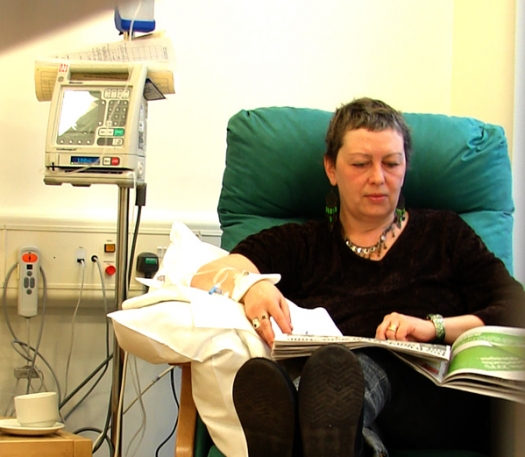ivtherapy.jpg

Photo by Andrew Richards, ©2008 / freeimages.com
Edith Frank of Algona, Iowa, was diagnosed with stage 4 metastatic cancer at the Mayo Clinic in 2005. Two years later, after undergoing surgery, chemotherapy, and radiation, she was given six months to a year to live. Then she learned about intravenous (IV) vitamin C and found a doctor who administered it. “I was lucky. Because I read Health & Healing, I knew that IV vitamin C is a valid adjunct cancer treatment. It has kept my cancer from growing for seven years now, since I was told to put my affairs in order.”
Vitamin C is one of the most popular nutrients, taken by millions in their daily multivitamins and as a stand-alone supplement. Most everyone knows this water-soluble antioxidant boosts immunity and helps ward off and minimize colds and flu, and many are aware that it helps prevent and/or treat heart disease, stroke, cataracts, gout, asthma, wounds, and other conditions. Fewer people, however, are familiar with high dose intravenous vitamin C – the therapy that enabled Edith and many others to defy their doctors’ dire predictions and recover from cancer.
Linus Pauling’s research undermined
The therapeutic power of IV vitamin C has been recognized since the 1970s, when Linus Pauling, PhD, and colleagues studied its effects in more than 1,000 patients with advanced cancer.
Compared to a control group of terminal patients treated with chemo and radiation, those who received oral and IV vitamin C reported significant improvements in quality of life and they lived, on average, four times longer!
Because Dr. Pauling was one of the most influential scientists of the 20th century and the only winner of two unshared Nobel Prizes, this got a lot of attention. That’s when Big Pharma and the cancer establishment stepped in. Rather than hailing IV vitamin C as the cancer breakthrough it was, they did all they could to discredit it – including blackballing Dr. Pauling and undermining his work by carrying out deliberately dishonest research.
The National Institutes of Health funded studies, conducted at the Mayo Clinic by an avowed critic of nutritional medicine, to further evaluate vitamin C in the treatment of cancer. None of these studies demonstrated any benefit. As it turns out, they were designed to fail. Key aspects of the Pauling protocol were ignored, such as stopping vitamin C prematurely.
Most significantly, IV vitamin C wasn’t used at all – patients were treated solely with oral supplements. No wonder it didn’t work!
Why IV is essential
IV vitamin C does things supplements could never do. That’s because the human body sets very tight limits on the amount of oral vitamin C that can be absorbed at any given time. Anything above and beyond 400–500 mg is rapidly flushed out in the urine. Repeat or higher dosing is perfectly safe, although large amounts are notorious for causing diarrhea. But even if you could tolerate very high doses, the maximum vitamin C blood concentration obtainable through oral intake is limited to less than 0.25 mmol/L.
IV administration, however, bypasses the gastrointestinal tract and this tight control mechanism. Therefore, exceptionally large doses may be infused – 100 g (100,000 mg) or more – resulting in blood concentrations as much as 70 times greater than the upper limit possible with oral supplements. This is important because only very high “pharmacological” concentrations of vitamin C can target cancer cells.
At these elevated blood levels, vitamin C works not as an antioxidant but as a “pro-oxidant.” It interacts with iron in the blood to create hydrogen peroxide, a type of free radical or reactive oxygen species. We tend to view free radicals in a negative light, but that’s not always the case. White blood cells, for example, use hydrogen peroxide to destroy pathogens.
The hydrogen peroxide created by vitamin C does not harm normal cells; however, it is toxic to cancer cells. It enters the extracellular fluid that surrounds tumors, damages their DNA, and interrupts their metabolism. IV vitamin C has been shown in multiple lab, animal, and human studies to outright kill or slow the growth of a range of cancer types, including breast, ovary, pancreas, colon, prostate, and liver as well as mesothelioma, sarcoma, multiple myeloma, and leukemia.
IVC’s role in cancer treatment
Although the despicable manipulation of the early research cemented conventional medicine’s bias against IV vitamin C – which continues to this day – this therapy is alive and well, thanks to the research and educational efforts of Drs. Jeanne Drisko, Hugh Riordan, Robert Cathcart, Thomas Levy, and other innovative physicians.
Today, IVC is most often used as an adjunct treatment, along with conventional cancer therapies. Studies show that it not only boosts their efficacy but also reduces fatigue, nausea, vomiting, and other common side effects of chemotherapy and radiation. For example, in a study published in February, women with advanced ovarian cancer who were treated with high-dose IV vitamin C along with the standard chemo had more energy and less drug related nausea. Vitamin C also enhanced the effectiveness of chemotherapy.
That has certainly been our experience at Whitaker Wellness. We recently administered IVC to a woman who was undergoing radiation following breast cancer surgery, and her doctors were amazed at how well she tolerated their treatment. A young man with a glioblastoma previously treated with surgery and radiation has been receiving regular IV infusions. He’s feeling well, and repeat scans show no further growth of his aggressive brain tumor.
There are documented cases of high-dose IV vitamin C actually curing cancer. But even if it’s not curative, this therapy has been repeatedly shown to extend the lives of patients with advanced cancer, giving them the precious gift of time. And because IVC is safe, well tolerated, and minimizes the adverse effects of chemo and radiation, that time is quality time. Anyone who has watched a loved one suffer through conventional cancer treatment knows how valuable that is.
To learn more, visit Dr. Whitaker's website.
References
Du J, et al. Ascorbic acid: chemistry, biology and the treatment of cancer. Biochim Biophys Acta. 2012 Dec;1826(2):443–457.
Cameron E, Pauling L. Supplemental ascorbate in the supportive treatment of cancer: Prolongation of survival times in terminal human cancer. Proc Natl Acad Sci USA. 1976 Oct;73(10):3685–3689.
Ma Y, et al. High-dose parenteral ascorbate enhanced chemo sensitivity of ovarian cancer and reduced toxicity of chemotherapy. Sci Transl Med. 2014 Feb 5;6(222):222ra18.
Originally published in Health & Healing, April 2014, Vol. 24, No. 4. Used with permission.


